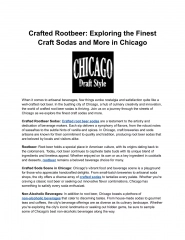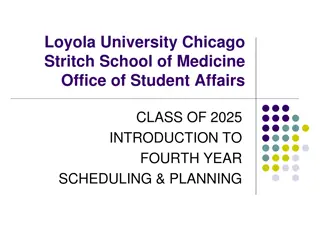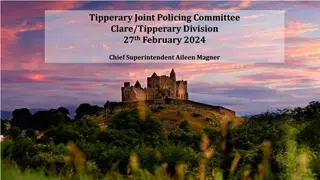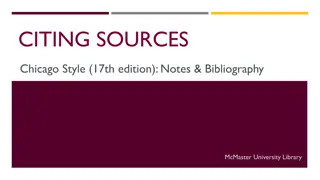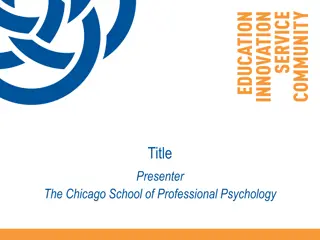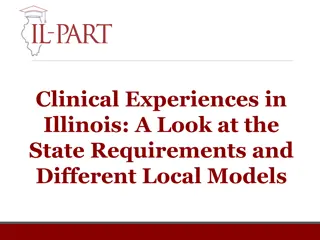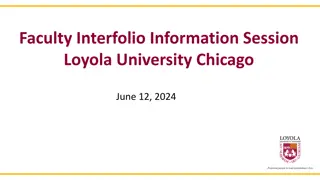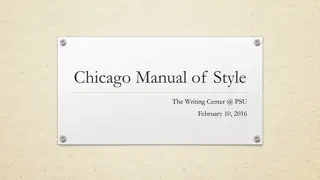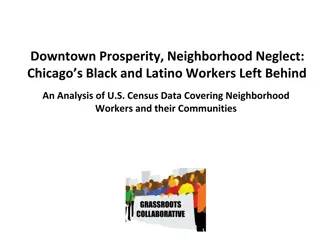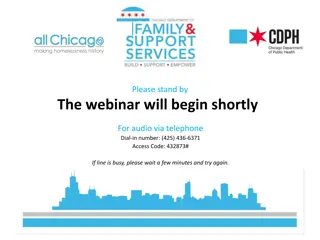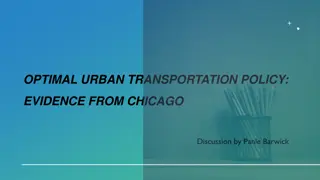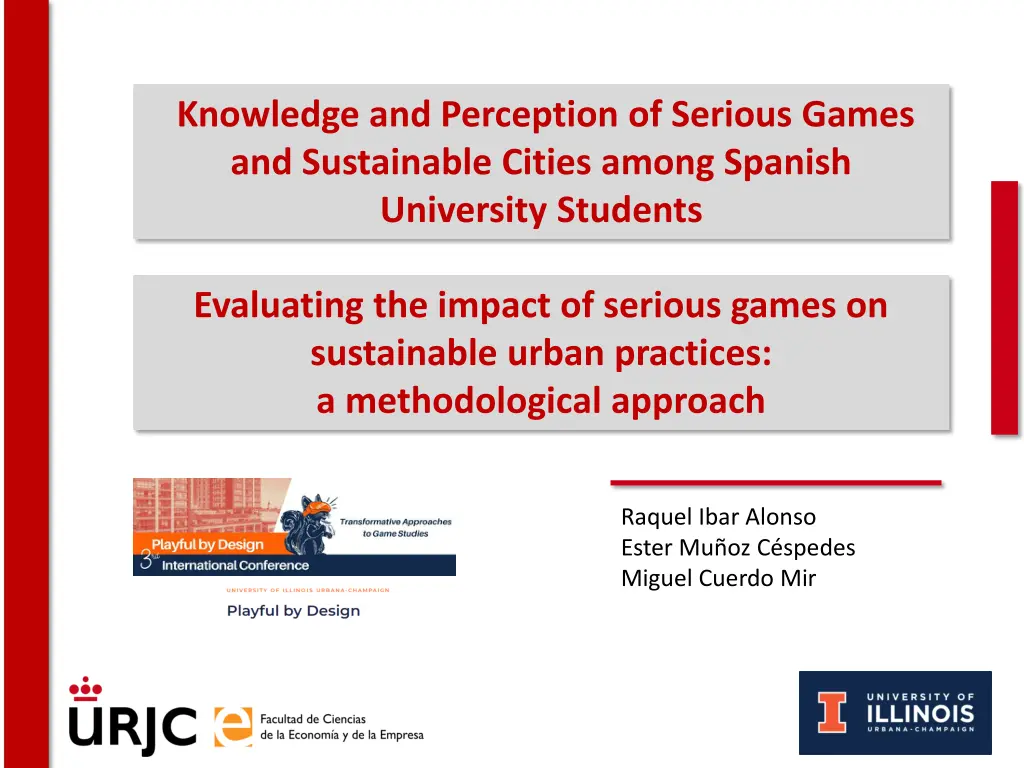
Understanding Serious Games Impact on Sustainable Cities among University Students
Explore the impact of serious games on sustainable urban practices among Spanish university students. This study evaluates knowledge levels, attitudes, and educational potential of serious games in promoting critical thinking and sustainability. Join the discussion on enhancing learning experiences and addressing urban sustainability challenges.
Download Presentation

Please find below an Image/Link to download the presentation.
The content on the website is provided AS IS for your information and personal use only. It may not be sold, licensed, or shared on other websites without obtaining consent from the author. If you encounter any issues during the download, it is possible that the publisher has removed the file from their server.
You are allowed to download the files provided on this website for personal or commercial use, subject to the condition that they are used lawfully. All files are the property of their respective owners.
The content on the website is provided AS IS for your information and personal use only. It may not be sold, licensed, or shared on other websites without obtaining consent from the author.
E N D
Presentation Transcript
Knowledge and Perception of Serious Games and Sustainable Cities among Spanish University Students Evaluating the impact of serious games on sustainable urban practices: a methodological approach Raquel Ibar Alonso Ester Mu oz C spedes Miguel Cuerdo Mir
Serious Games Serious games (SG) are designed to promote: Education Training Behavioral changes By combining traditional game elements with pedagogical content, SGs improve engagement and interactivity in learning experiences. They allow learners to experience real-world situations that may otherwise be difficult to encounter. The primary goals of applying serious game-based approaches in these domains stem from the benefits to training, motivation, and education in domain-specific areas.
Objectives Evaluate the level of knowledge about sustainable cities among university students. Identify students attitudes and motivation regarding sustainability. Analyze the educational potential of serious games in this area. Promote critical thinking and contextualization. Establish interrelations with social, economic, and environmental issues. Encourage the application and decision-making framed within economic, environmental, and social criteria. Connect interactive learning with the current challenges of urban sustainability
Justification Serious Games Facilitate active and meaningful learning Growth in the number of people who play games on a daily basis Technological advances that allow the development of attractive games. Need for a shared vision to address social and environmental problems. Education in Urban Sustainability Rapid urbanization creates challenges such as pollution and climate change. Promoting a culture of social responsibility. Transform students into agents of change
Serious games focused on sustainable cities Serious Games Sustainable Cities Behavioral Learning Data Mining Text Mining
Research questions 1. How has the Serious Game (SG) affected participants understanding of sustainable cities? 2. What are the workload and motivation levels of participants during the SG? 3. How has the SG affected the engagement of participants? 4. How effective is the SG in promoting meaningful learning and behavioral changes towards more sustainable practices?
Population and Context Target Population: University students. Instrument: Socio-Demographics Knowledge Motivation and Interest Expectations and Learning Context: Given that they are students, it is relevant to explore how they perceive urban sustainability and the use of innovative tools such as serious games in education.
Evaluation Serious Game Type Participant profiles Pre-Test quest. Post-Test quest. SG experience quest. Questions Conocimiento Motivaci n Expectativas y aprendizaje Compromiso 5-point Likert-scale 5-point Likert-scale 5-point Likert-scale 5-point Likert-scale Free-text responses Free-text responses Free-text responses Free-text responses
Knowledge Describe your level of knowledge about sustainable cities (before and after participating in the SG). What specific aspects do you feel you have learned or improved? Before: After: Rate your level of knowledge about sustainable cities (before and after participating in the SG). Very low Low Medium High Very high Before After
Motivation Describe your motivation to learn about sustainable cities before and after participating in the serious game. What specific aspects of sustainable cities do you feel motivated to explore further, and how has the game influenced your interest in this topic? Before: After: Rate your level of motivation to learn about sustainable cities (before and after participating in the serious game): Very low Low Medium High Very high Before After
Expectations and learning How has your understanding of sustainable cities changed after participating in the SG? Provide specific examples of what you have learned. Before: After: Evaluate your level of understanding of sustainable cities (before and after participating in the SG). Very low Low Medium High Very high Before After
Analysis of the results Text Mining Data Mining Co-ocurrenceAnalysis Word Frequency SentimentAn lisis (NLP) Comparative Analysis Descriptive Analysis Comparative Analysis (M)ANOVA Clustering Feedback
Benefits ofText Mining Recurring Topics Learning Trends Identification of Topics and Trends Sentiment Analysis Depth of Knowledge Change in Confidence Evaluation of Understanding and Confidence Sentiment Analysis Attitudes Towards Learning Detection of Sentiments and Attitudes
Benefits ofText Mining Constructive Comments Suggestions for Improvement Detailed Feedback Comparison Between Targets Demographic Differences MethodologyAdaptation
Conclusions Broad Target Audience Inclusive of people with various levels of knowledge on sustainable cities. Covers different profiles. Engagement through Serious Games Active participation improves critical decision-making and problem- solving skills. Prepares future generations to reduce environmental impacts responsibly. Assessing Impact Evaluation will reveal if the game effectively improves sustainable awareness and behavior. Provides valuable insights and recommendations for future educational initiatives.
Thank you for your attention Raquel Ibar Alonso Ester Mu oz C spedes Miguel Cuerdo Mir

